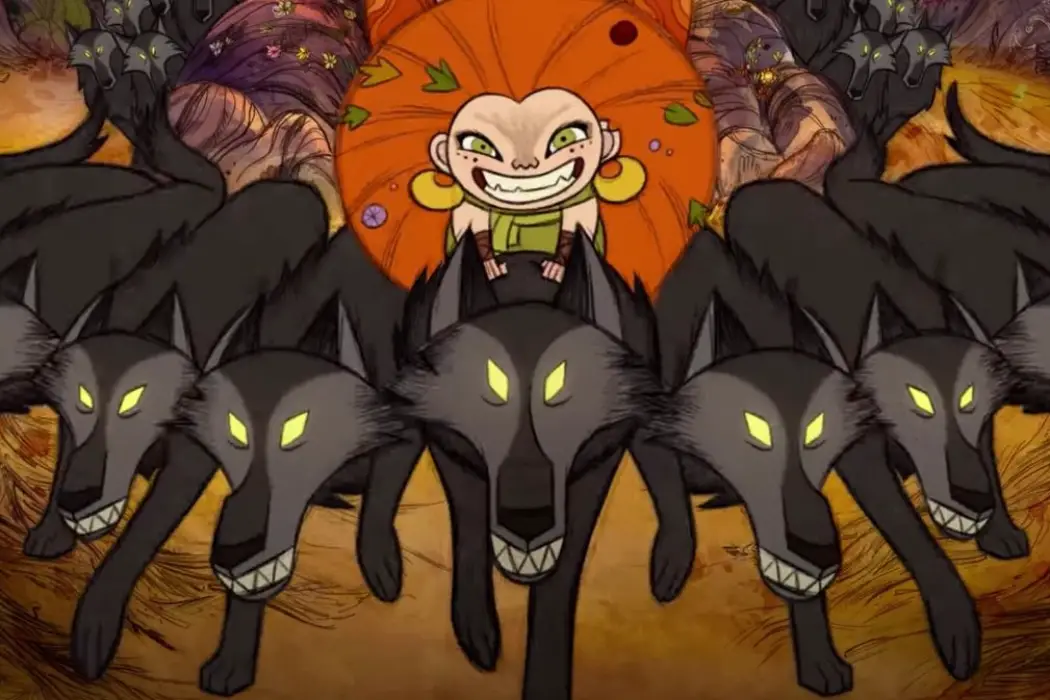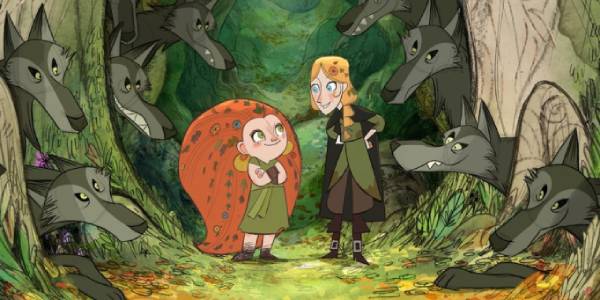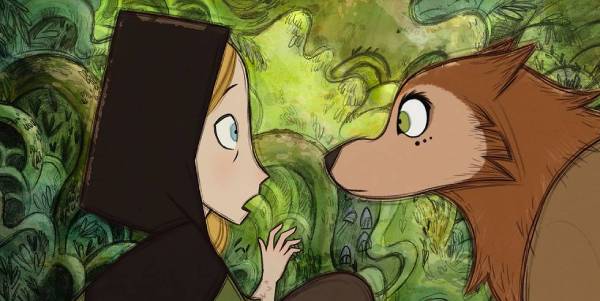London Film Festival 2020: WOLFWALKERS

Former film student from Scotland turned writer and film reviewer.
There is still a little time left – and Pixar has yet to release their highly anticipated feature Soul, which will likely be in contention – but Wolfwalkers is almost certainly the best-animated film of the year. The third in the unofficial folklore trilogy from Irish studio Cartoon Saloon, it is brimming with charm, wonder, and jaw-dropping visuals – living up to the promise inherent from The Secret of the Kells and Song of the Sea. While they can’t boast the same output as Studio Ghibli, Cartoon Saloon’s catalog sees them become one of the last bastions of hand-drawn animation, especially since the decline of their Japanese counterparts.

Beginning with 2009’s Oscar-nominated Secret of the Kells, Tomm Moore and Nora Twomey set a precedent for lushly designed animation, rooted in Celtic mythology. Kells was unique in its presentation, like a stained glass window come to life. It boasted not just incredible visuals but an engrossingly layered tale that appealed to both children and adults. In 2014 the studio doubled down with the astonishingly beautiful Song of the Sea, which expanded on those visuals and proved Cartoon Saloon was growing more and more confident with their storytelling. Now, with Wolfwalkers, they have proven their right to be mentioned amongst the greatest animation studios in history.
Kilkenny & the Forest of Wolves
Wolfwalkers is set in County Kilkenny (where Cartoon Saloon themselves are based) in 1650, during the English invasion of Ireland under the direction of Oliver Cromwell. The Lord Protector himself has ensnared the village, where he intends to cut down the nearby forest to make land for farming. This upsets the wolves who have made their home in the forest, and so Cromwell sends Bill Goodfellowe (voiced by Sean Bean, comfortably filling in the Ned Stark/Boromir role he could surely do in his sleep by now) to kill them. Bill is devoted to his daughter Robyn (Honor Kneafsey) whose mother, it is implied, passed away, entrusting Bill with her safety. Bill takes this very seriously and tries desperately to ensure his daughter stays safe in the village while he is out hunting wolves. Robyn, however, wants to be a hunter like her father. She is headstrong and tomboyish, akin to Brave‘s Merida in ways, and determined to hunt. Full of curiosity, she ventures out to the forest in search of her father but instead stumbles upon a pack of wolves and a very strange little girl called Mebh (voiced by Eva Whittaker) who claims to be a mythical Wolfwalker – folk whose souls become wolves at night when they sleep.
Co-directed by Tomm Moore, and art-director Ross Stewart, Wolfwalkers is a visual feast throughout. Early scenes in the village of Kilkenny are set in straight, rigid lines. A perfectly ordered, perfectly constrained, contrast to the later forest scenes. When shown from a bird’s eye view, the town is boxy and claustrophobic. Its inhabitants are shown in small boxes quartered in the screen, identically sweeping, cleaning, carrying. It bears a slight relation to the Andersonian style but here it is used to emphasize the order and rigidity of town life. The forest, of course, is almost the virtual opposite.

Abound with verdant greenery which flows like a wild ocean (the wolves themselves seem fluid, flowing from scene to scene gracefully as though part of a river breaking through the trees), Mebh’s forest feels truly alive; a vast tapestry of flowing colors, stretching to and fro, refusing to adhere to any order or rhythm except its own. An incredible sequence taking place around halfway through the movie shows Robyn and Mebh explore the forest, allowing their wolf senses to guide them. It’s brilliantly done and incredibly clever, transcending the traditional use of visual animation and doing something altogether new with it. To say more would be to spoil both the plot and the joy of discovery, but rest assured it is a standout set piece in a movie full of them.
Man Versus Nature
While the animation is flawless, the story itself is also profoundly moving. Essentially a retelling of man versus nature stories such as Dances With Wolves, Fern Gully, or Pocahontas, Wolfwalkers adds in the perils of colonialism and utilizes a father/daughter dynamic that never feels tired or clichéd. Bill and Robyn’s relationship anchors much of the narrative, highlighting how fear can make decisions for us where our children are involved. Every decision Bill makes, he does so with Robyn at the forefront of his mind, and even though some of those decisions are directly hurtful to Robyn, we can understand why Bill does them. He always has Robyn’s safety forefront. There’s even a nice little turnaround later where Robyn assumes this same role with Mebh, making a difficult decision that will hurt Mebh but ultimately is for her own protection.
As to the colonialism, Ireland is no stranger to English invasions. Simon McBurney‘s Cromwell is a puritanical nightmare, strutting around as though he serves a higher purpose than anyone else and is even more insidious because he truly believes it. He bears more than a passing resemblance (personality-wise) to Judge Frollo in The Hunchback of Notre Dame and is effective because his particular brand of villainy is all-too recognizable
Elsewhere, the relationship between Robyn and Mebh is tenderly drawn out. It’s sweetly effective because it evokes the real-life nature of friendships: though they dislike each other greatly at first, Mebh is cloying and hyperactive and Robyn is a ‘townie’ who doesn’t understand the forest, they quickly fall into a natural rhythm with each other. A sequence sees Mebh and Robyn sitting atop a tree branch discussing the forest. While the dialogue continues, Robyn pulls a brush from her pocket and begins to brush Mebh’s hair. Neither of them refers to this or even acknowledge that it’s happening. It’s simply a testament to their friendship that acts like that can be taken for granted.

The final piece of the puzzle is Mebh’s mother, Moll. She is the lead protector of the wolves but has mysteriously disappeared. Mebh awaits her return patiently, assuring Robyn that her mother could never be caught, and would never leave her, but Robyn isn’t so sure. Again, to say more would be to ruin it, but suffice it to say Moll’s role is akin to Bronach’s in Song of the Sea. She shares a sentimental moment with her daughter in the third act which will leave not a dry eye in the house. It is beautifully realized and deftly handled.
Conclusion
Wolfwalkers is quite simply marvelous. It’s a wonderfully rendered Celtic fable that stands up alongside the best and sits comfortably with The Secret of the Kells and Song of the Sea in Cartoon Saloon’s folktale trilogy. In an era where hand-drawn animations are fewer and fewer, films like this one ought to be shouted from the rooftops and celebrated. It is almost a certainty that Wolfwalkers will be talked about for years to come, and hopefully, this is just the beginning of a fantastic career for Cartoon Saloon.
Wolfwalkers drawn from traditional Celtic fables to tell its story. Do you have any favourite fables? Let us know in the comments below!
Wolfwalkers will be released in the UK and Ireland on October 30th, and in the US on 11 December. For more release dates, please click here.
Watch Wolfwalkers
Does content like this matter to you?
Become a Member and support film journalism. Unlock access to all of Film Inquiry`s great articles. Join a community of like-minded readers who are passionate about cinema - get access to our private members Network, give back to independent filmmakers, and more.













